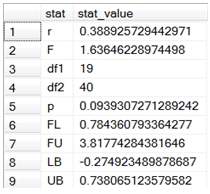ICC
Updated: 24 May 2013
Use the table-valued function ICC to calculate the intra-class coefficient. The ICC is used to assess the consistency of measurements made by multiple observers measuring the same quantity.
Syntax
SELECT [wctStatistics].[wct].[ICC](
<@InputData_RangeQuery, nvarchar(max),>
,<@TypeTest, nvarchar(4000),>
,<@Alpha, float,>
,<@R0, float,>
,<@RV, nvarchar(4000),>)
Arguments
@InputData_RangeQuery
a T-SQL statement, as a string, that specifies the subject, rater, and rating values.
@TypeTest
ICC_TV support six different types of ICC:
· one-way, consistency, single measure — ICC(1,1), '1-1'
· one-way, consistency, average measure —ICC(1,k), '1-k'
· two-way, agreement, single measure — ICC(2,1), '2-1'
· two-way, agreement, average measure — ICC(2,k), '2-k'
· two-way, consistency, single measure — ICC(3,1), '3-1'
· two-way, consistency, average measure — ICC(3,k), '3-k'
@Alpha
the value to be used in the calculation of FL and FU. Must be of type float or of a type that implicitly converts to float.
@r0
the specification of the null hypothesis r = r0. r0 is used in the calculation of the F-value which is subsequently used in the calculation of the p-value. Must be of type float or of a type that implicitly converts to float.
@RV
the value to be returned by the function. Use the following values:
|
'R'
|
the test statistic
|
|
'F'
|
the F value
|
|
'DF1'
|
the degrees of freedom 1 for the F distribution
|
|
'DF2'
|
the degrees of freedom 2 for the F distribution
|
|
'P'
|
the p-value (calculated from the F distribution)
|
|
'FL'
|
the lower confidence level, for the specified alpha, of the F distribution
|
|
'FU'
|
the upper confidence level, for the specified alpha
|
|
'LB'
|
the p-value associated with FL
|
|
'UB'
|
the p-value associated with FU
|
Return Type
float
Remarks
· The function is insensitive to order; it does not matter what order the ratings are passed in.
· Subjects, raters, ratings are automatically combined by the function.
Examples
DECLARE @case_icc as varchar(3)
SET @case_icc = '1-k'
SELECT n.s
,x.rater
,x.rating
INTO #i
FROM (
SELECT 1,3,3,2 UNION ALL
SELECT 2,3,6,1 UNION ALL
SELECT 3,3,4,4 UNION ALL
SELECT 4,4,6,4 UNION ALL
SELECT 5,5,2,3 UNION ALL
SELECT 6,5,4,2 UNION ALL
SELECT 7,2,2,1 UNION ALL
SELECT 8,3,4,6 UNION ALL
SELECT 9,5,3,1 UNION ALL
SELECT 10,2,3,1 UNION ALL
SELECT 11,2,2,1 UNION ALL
SELECT 12,6,3,2 UNION ALL
SELECT 13,1,3,3 UNION ALL
SELECT 14,5,3,3 UNION ALL
SELECT 15,2,2,1 UNION ALL
SELECT 16,2,2,1 UNION ALL
SELECT 17,1,1,3 UNION ALL
SELECT 18,2,3,3 UNION ALL
SELECT 19,4,3,2 UNION ALL
SELECT 20,3,4,2
)n(s,r1,r2,r3)
CROSS APPLY(
SELECT 'r1', r1 UNION ALL
SELECT 'r2', r2 UNION ALL
SELECT 'r3', r3
)x(rater,rating)
SELECT p.stat
,wct.ICC('SELECT s,rater,rating FROM #i', @case_icc, NULL, NULL, p.stat) as stat_value
FROM (
SELECT 'r' UNION ALL
SELECT 'F' UNION ALL
SELECT 'df1' UNION ALL
SELECT 'df2' UNION ALL
SELECT 'p' UNION ALL
SELECT 'FL' UNION ALL
SELECT 'FU' UNION ALL
SELECT 'LB' UNION ALL
SELECT 'UB') p(stat)
This produces the following result.
